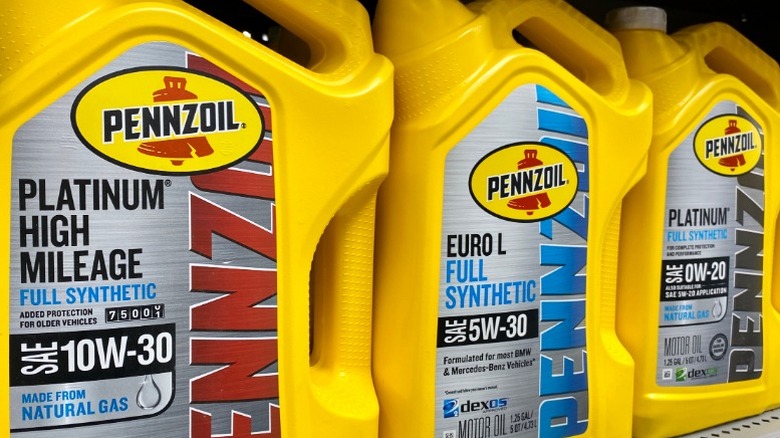Should You Use Thicker Oil In A High-Mileage Engine?
Despite the rise in popularity of electric vehicles (EVs) in recent years, for now, internal combustion engines still rule the roads. Humanity relies on these engines for everything from personal transportation to food delivery, emergency services, and more. But while gas and diesel-powered vehicles are robust and generally extremely reliable, they can't handle all of those responsibilities without care and maintenance. As you probably know, fossil-fuel-powered engines depend on engine oil to lubricate the internal moving parts and prevent the buildup of friction and excess heat. Since that oil degrades over time, regular replacements are necessary to keep the engine and the vehicle running smoothly. However, as engines age, they often require specialized care. When it comes to engine lubrication, high-mileage oils are one of the standard ways to protect cars with older engines.
In addition to using high-mileage oil, you may have heard people suggest using a thicker or more viscous oil in your older engine. While there is some merit to using a thicker oil in a high-mileage engine in some special situations, you shouldn't arbitrarily make the switch without professional guidance. For the vast majority of drivers, the fact is that you should always use the oil type and classification recommended by your vehicle's manufacturer whenever possible.
For most modern, mainstream cars, it's incredibly easy to find high-mileage engine oil in the same viscosity as your automaker suggests, and that's what you should be using in your older vehicle. If you're interested in learning more about high-mileage engine oil and what makes it beneficial for older cars, stick around. As a former professional auto repair technician, I'll shed some light on the issue for you.
What to know about high mileage oil
As mentioned, it's normal for engines to develop wear and tear as they age and accumulate mileage. Metal surfaces can wear down over time, and rubber components like seals can crack or develop leaks. Once an engine has developed sufficient wear, these issues can lead to performance problems and contribute to things like oil leaks, loss of power, and reduced fuel mileage.
In order to help prevent these problems and keep older engines running smoothly, many experts recommend using high-mileage engine oil for cars with more than 75,000 miles on the odometer. These oils are formulated specifically to help combat the issues that can plague older engines and typically contain special ingredients, like anti-wear additives, seal conditioners, and detergents. It's important to note that high-mileage oil cannot fix an engine that's already in poor condition, and it is not a substitute for regular maintenance. However, it can be a useful way to help prevent the development of age-related damage in well-maintained engines.
Once your car hits the 75,000-mile mark, you can and should start using high-mileage oil. That doesn't mean you need to use a thicker or more viscous oil, though. You should continue using the oil that your vehicle's manufacturer recommends, as outlined in your owner's manual. Various companies produce high-mileage engine oil, and it's easy to find these products in various popular viscosities, like 5W-30, 5W-20, and 0W-20.

